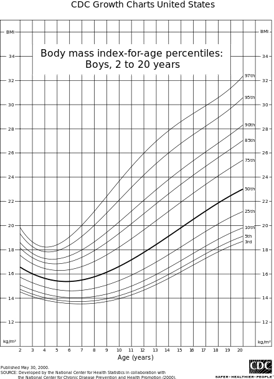
What is a healthy weight? You would not expect it to be the same value for someone who is 6’4” versus someone who is 5’0”. Body Mass Index, or BMI is a value derived from the mass (weight) and height of a person. Specifically, we take a person’s mass in kilograms and divide it by their height in meters squared (kg/m2). Basically, we use BMI as a measure of a person’s mass relative to his or her height.
Generally, a normal BMI for adults is anywhere between 18.5 kg/m2 and 25 kg/m2. Below this range is considered to be underweight. Between 25 kg/m2 and 30 kg/m2 is classified as overweight, and above 30 kg/m2 is called obese. Note that BMI does not take into consideration one’s body composition. For example, a highly muscular bodybuilder may weigh a lot and have a higher BMI despite having little fat. Nevertheless, BMI is a decent rule of thumb to quickly gauge whether someone is at a healthy weight.
On the other hand, the range of a normal BMI varies by age and sex for children. The two growth charts below show BMI versus age broken down by percentiles. A child whose BMI is greater than the 85th percentile is considered overweight and greater than the 95th percentile is considered obese. For example, a 7-year-old male child with a BMI of 20 falls in the 97th percentile for his age group and is obese.


The rising prevalence of childhood obesity is a serious problem in the United States today. From 2017-2018, data shows that childhood obesity was 19.3%, affecting 14.4 million children and adolescents. More and more children are now at risk for obesity-related health problems such as high blood pressure, high cholesterol, insulin resistance or type 2 diabetes, sleep apnea, joint problems, fatty liver, and low self-esteem. They are also more likely to develop obesity in adulthood, putting them at risk for heart disease, type 2 diabetes, and cancer. Childhood obesity has higher prevalence in Blacks and Hispanics, adolescents, and children in low-income families.
What can we do to help prevent childhood obesity? Here are some tips:
- Limit screen time and encourage children to play outside.
- Avoid purchasing empty carbs such as potato chips, cheese crackers, and candy.
- Avoid highly processed foods in general.
- Stay away from soda, sugary drinks, or even too much juice. One can drink a lot of calories without feeling full.
- Try to have healthy snacks available such as fruits and vegetables.
- Include complex carbohydrates with means such as whole oats or whole wheat/grain bread and avoid simple carbohydrates like white bread and French fries.
- Try to include plenty of vegetables with meals.
- Go for walks with your kids or make time to be active together.
Unfortunately, many people live in environments where healthy food may be hard to access, or too expensive. Working multiple jobs may make it very difficult to find time for activities. Some neighborhoods may be unsafe for playing outside. Get creative and do your best. Try to incorporate one healthy habit at a time. Try to schedule things like grocery shopping or physical activities as best as you can. If you have a freezer, try freezing vegetables so they last longer. Go online to find efficient ways to prepare meals. Even if your efforts are not perfect, small changes can go a long way in keeping you and your family healthy.
 Dr. Simpson is a resident physician who sees patients of all ages and provides obstetrical services at Lone Star Family Health Center, a non-profit 501©3 Federally Qualified Health Center operating facilities in Conroe, Spring, Willis, Grangerland, and Huntsville, and serving as home to a fully integrated Family Medicine Residency Program to increase the number of Family Medicine physicians for Texas and our community.
Dr. Simpson is a resident physician who sees patients of all ages and provides obstetrical services at Lone Star Family Health Center, a non-profit 501©3 Federally Qualified Health Center operating facilities in Conroe, Spring, Willis, Grangerland, and Huntsville, and serving as home to a fully integrated Family Medicine Residency Program to increase the number of Family Medicine physicians for Texas and our community.



